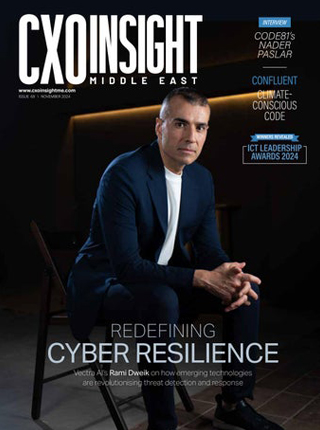Today’s young employees are the engines of the knowledge economy and tomorrow’s business leaders. And according to The Born Digital Effect, the latest research from Citrix Systems they’re primed to deliver an extra $1.9 trillion globally and $51 billion in the UAE in corporate profits. But they’ll need some help to pull it off.
Made up of Millennials (born 1981 to 1996) and Generation Z (born after 1997) workers, the Born Digital are the first generation to grow up in an entirely digital world and now account for most of the global workforce.

“The Born Digital generation is the C-Suite of the near future,” said Amir Sohrabi, Area VP for Emerging Markets, Citrix. “As early as 2035, the fate of businesses – and by extension, global economies – will be in their hands. This research is a wake-up call to business leaders that they may not fully understand those who have been ‘born digital’ and must take the time to do so. Successfully attracting and retaining the next generation of leaders will require organisations to invest in the flexible, efficient and engaging work environment in which they thrive.”
To help them do this, Citrix, together with Coleman Parks Research and Oxford Analytica, conducted The Born Digital Effect, a study that combined global opinion research from 1,000 business leaders and 2,000 knowledge workers in 10 countries (including the UAE) to understand what the Born Digital want from work with economic modelling to quantify the impact they can have on business and the larger economy.
And it revealed that when it comes to understanding what engages and motivates younger workers, leaders are out of touch. Among the key findings:
Long-term goals and work-life balance matter most to employees – Faced with an uncertain job environment, younger workers in the UAE are most focused on fundamental work factors like long-term career prospects (92 percent) and a good work-life balance (91 percent). This is poorly understood by leaders, who think their young workers value access to the latest workplace technology and opportunities for training.
Leaders overestimate office appeal – 90 percent of Born Digital employees in the Emirates do not want to return to full-time office work post-pandemic, preferring a remote or hybrid model instead.
- Half (50 percent) want to remain working from home most or all of the time.
- 20 percent would like hybrid working with more time in the office
- 21 percent would like hybrid working with time evenly split between home and the office
- Only 10 percent would like to be in the office full time
But, 73 percent of leaders believe that young workers will want to spend most or all of their time working in the office.
While they may prefer to work remote, Born Digital workers recognise that social interaction is crucial in a business context (7 percent).
“As companies move forward in enabling work from anywhere, they will need to provide opportunities for employees to come together both physically in offices and virtually from home to keep them connected, engaged and prepared for the future of work,” Sohrabi said.
More than anything, the Born Digital want employers who give them flexibility and choice –Although a five-day week is still a popular working pattern, the Born Digital believe that they should be given the opportunity to work a four-day week if they choose (15 percent). They also expect to be able to decide when to begin and end their working day (26 percent), and a few want to work unstructured or output-based hours (8 percent).
And they want to be given a high-trust and collaborative culture to work – When asked to identify the three most important aspects of company culture they look for in choosing an employer, the Born Digital cited:
- Autonomy, or the opportunity to work in a high-trust environment (87 percent)
- Highly collaborative culture (87 percent)
- Prioritises learning and development (87 percent)
Young workers and leaders inhabit different digital worlds – Only 8 percent of business leaders in the UAE use instant messaging apps like Slack or WhatsApp for work purposes, compared to 82 percent of Born Digital employees. And only 12 percent of business leaders like using these apps for work, compared to 88 percent of Born Digital workers.
Purpose is a privilege, not a priority – Only 31 percent of Born Digital employees would leave an organisation that lacked purpose, compared to 70 percent of business leaders. And only 30 percent of Born Digital workers would leave a role if they felt the culture did not reflect their personality adequately, compared to 57 percent of business leaders.
As the data makes clear, today’s business leaders are clearly disconnected from what the Born Digital really want from work. And in order to unlock their full potential and the value they can deliver, they need to plug in.
“Successfully attracting and retaining the Born Digital will require organisations to invest in the work model and tools to create the flexible, efficient and engaged work environment that this next generation of leaders craves and thrives in,” said Tim Minahan, Executive Vice President of Business Strategy, Citrix. “And there is clear commercial benefit to doing so.”
To quantify these benefits, Citrix worked with economists to build an economic model that assessed the impact of Born Digital employees on companies’ profitability, examining the relationship between the size of a country’s Born Digital population and the profitability of that country’s businesses.
Countries in the study with relatively well-developed education systems or younger populations compared to their peers – such as the US, China, the UAE, Mexico, the UK and the Netherlands – are benefiting most from the Born Digital dividend as their above-average Born Digital populations are helping to ensure their businesses enjoy greater profitability, now and in the future.
Conversely, countries with relatively older populations such as France, Germany and Japan or lower levels of higher education among the younger population, have the potential to reap greater rewards if they invest in higher education and digital infrastructure, actively recruit younger workers, and adapt their workplaces and working practices to suit them.
To secure the future economy, companies need to cultivate younger workers and adapt their workplaces and working practices to groom them today,” Minahan said.










Discussion about this post